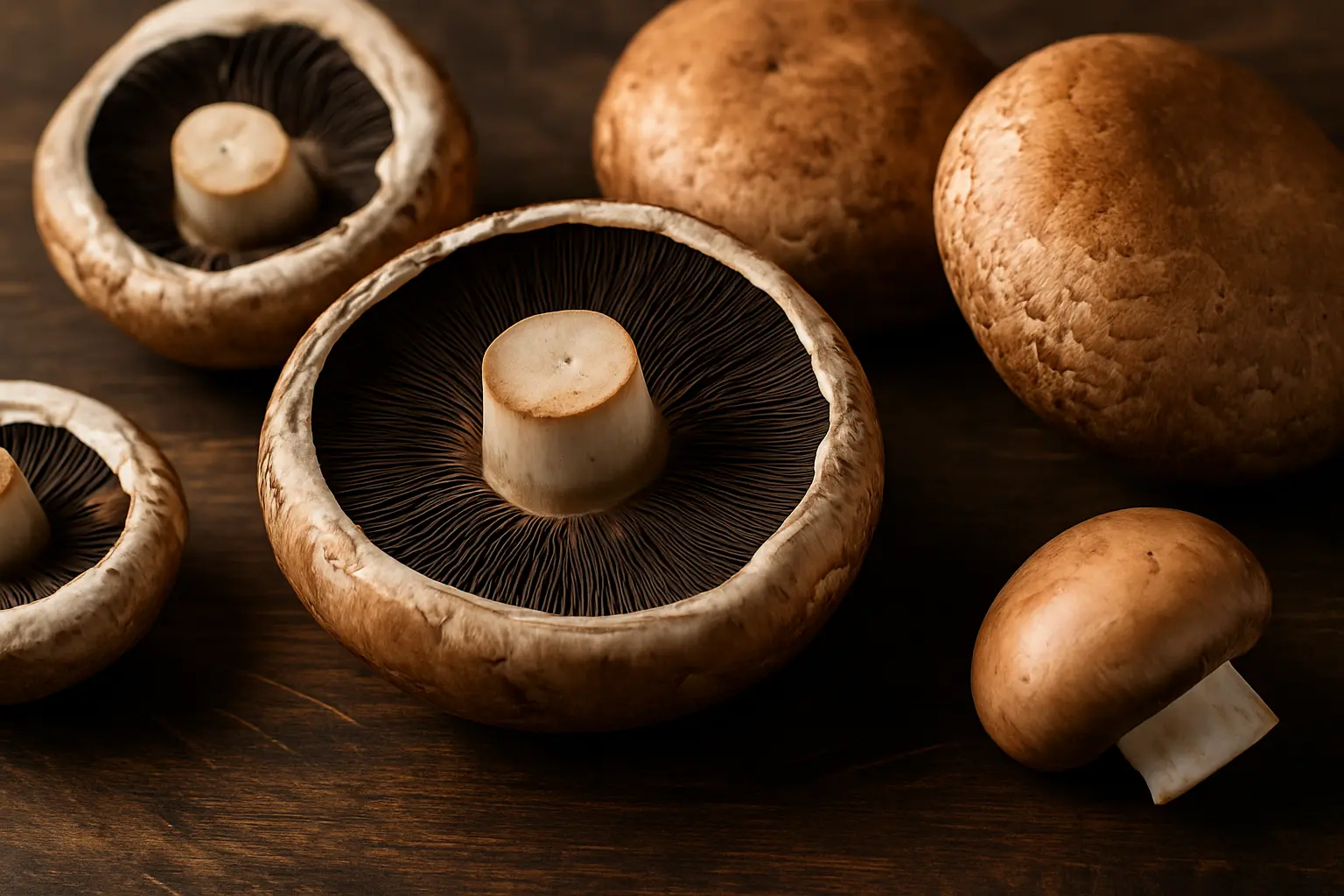Last updated: June 27, 2025

Introduction
Paul Stamets, a renowned mycologist and advocate for the potential of mushrooms to revolutionize health and the environment, has often been at the center of various intriguing discussions. One such topic is the so-called “Portobello Mushroom Conspiracy.” This theory suggests that portobello mushrooms, one of the most commonly consumed fungi, might have hidden dangers.
Let’s explore the science behind this claim and separate fact from fiction. Are portobello mushrooms dangerous? What is the portobello mushroom secret?
Who is Paul Stamets? Exploring The Mycologist Behind The Portobello Mushroom Controversy
Paul Stamets is a prominent figure in the world of mycology. He has dedicated his life to studying fungi and their potential benefits. Stamets has published numerous books and papers, highlighting the medicinal properties of various mushrooms, including their potential to boost the immune system, brain health, emotional wellbeing, fight cancer, and even clean up environmental pollutants. His work has earned him respect and recognition in both scientific and popular circles.
His work on functional mushrooms like Lion’s Mane and psilocybin has inspired new approaches to mental health, trauma recovery, and holistic healing.
The Portobello Mushroom Conspiracy
The portobello mushroom conspiracy theory posits that these popular mushrooms might contain harmful compounds. This idea of Portobello mushroom health risks gained traction when Paul Stamets, during a podcast, hinted at undisclosed risks associated with consuming portobello mushrooms. He refrained from elaborating, which only fueled speculation and concern.
Portobello Mushroom Health Risks
Hydrazine And Agaritine In The Portobello Mushroom: The primary concern regarding portobello mushrooms centers around two compounds: hydrazine and agaritine. Hydrazine is a known carcinogen, and agaritine, found in various Agaricus species (including portobellos), can convert into hydrazine derivatives.
Paul Stamets Mushroom Research Findings: Studies have shown that agaritine can be broken down into potentially harmful compounds, but the levels of these compounds in mushrooms are generally low. Most research suggests that, when consumed in moderation as part of a balanced diet, the health benefits of mushrooms far outweigh any potential risks.
Cooking Mushrooms to Reduce Toxins: Cooking mushrooms significantly reduces the levels of agaritine. Since portobello mushrooms are typically cooked before consumption, the risk of exposure to harmful compounds is further minimized.
Paul Stamets’ Perspective Perspectives on Portobello Mushrooms and Associated Health Concerns
Paul Stamets has been vocal about the incredible benefits of mushrooms, advocating their use in medicine, environmental restoration, and more. His cautionary remarks about portobello mushrooms likely stem from his deep knowledge of fungi and a desire to encourage informed consumption. However, without specific details, his comments should be viewed in the context of promoting awareness rather than inciting fear.
Portobello Mushroom Nutrition Facts: Benefits and Risks of Consumption
Portobello Mushroom Nutrition Facts & Benefits : Portobello mushrooms are rich in vitamins, minerals, and antioxidants. They provide a good source of B vitamins, selenium, and potassium, contributing to overall health and well-being.
Culinary Versatility: Portobello mushrooms are celebrated for their meaty texture and umami flavor, making them a popular choice for vegetarians and meat-eaters alike. They are commonly used in a variety of dishes, from grilled portobello burgers to hearty mushroom stews.
Balanced Diet: Like any food, moderation is key. Including a variety of mushrooms in your diet can provide numerous health benefits without the need for concern over specific compounds.
Final Thoughts on the Portobello Mushroom Conspiracy and Safe Consumption Practices: Are Portobello Mushrooms Safe to Eat?
The portobello mushroom conspiracy highlights the importance of understanding the science behind the foods we eat. While Paul Stamets’ comments have raised questions, the scientific community generally agrees that portobello mushrooms, when prepared and consumed properly, are safe and nutritious.
Mushrooms, including portobellos, offer a range of health benefits and can be a valuable part of a balanced diet. By staying informed and considering the broader context of nutritional science, we can continue to enjoy these delicious fungi without undue worry.
The Mystery and Magic of Mushrooms

It might seem crazy, but mushrooms are some of the most brilliant and conscious living systems on Earth. They are not the answer to everything, but they hold vast arrays of secrets and value that must be explored and embraced.
Paul Stamets and other fungi researchers have uncovered a variety of tremendous properties that mushrooms have that can help us improve our emotional, mental and physical health. These include Lion’s Mane, cordyceps and Reishi. These are now increasingly used in healing protocols or simply taken as supplements to boost performance.
Paul Stamets and other mushroom aficionados are rightly fascinated by mushrooms – in the end, much as it is interesting, the Portobello mushroom controversy is merely a distraction from the deeper, more important truths about fungi. When used appropriately, mushrooms can help us improve our health in ways that help us navigate our lives with more clarity, balance and strength.
More than this, their behaviour reveals a very high level of intelligence, and are emerging as potential healers of our planet through pollution remediation, soil restoration, water filtration and more. Read about the intelligence of mushrooms, in my article How Mushrooms and Trees Communicate: The Hidden Mycelial Networks.
Mushrooms don’t just feed us – they help us heal and teach us about resilience, healing, and interconnectedness.
The Most Profound Path To Healing
It’s no wonder that Earth still has hidden surprises for us. While much was suppressed throughout the ages, Consciousness is now speaking in tones we can hear and absorb. She is loud and clear.
It’s nearly impossible to calculate the immense benefits of our planet’s herbs. Matched with what conscious scientists are extracting and creating to help us heal (not simply placating symptoms) – we begin to see that every medicine we need is readily available to us. Your medicinal stack – the one that frees you from pain – is already here. If you’re open and earnest, it will make itself known to you.
You are built for miraculous healing. If you can focus on creating an integrative protocol, you can not only heal your body, but you’ll free your mind and heart. We can work together to create what you need.
This is the age of owning your physical and spiritual transformation. Through a well-curated medicinal stack, you might even find assistance in your pursuit of liberation.
Explore More Articles About Mushrooms:
Healing Trauma with MDMA and Mushrooms
Microdosing Psilocybin: The Science Behind Its Brain-Boosting Effects
Frequently Asked Questions (FAQ)
Are Portobello mushrooms dangerous?
Portobello mushrooms contain small amounts of natural compounds called hydrazines, including agaritine, which in some studies have shown potential links to cancer in animals. However, cooking significantly reduces these compounds, and for most people, eating cooked portobellos in moderation is considered safe.
What is the Paul Stamets Portobello Mushroom controversy?
During an episode of the Joe Rogan Experience, Paul Stamets mentioned concerns about portobello mushrooms but stopped short of explaining, hinting at potential legal or safety reasons. This vague statement has since sparked widespread speculation across Reddit forums and health blogs.
What are the benefits of Portobello mushrooms?
Despite the controversy, portobellos are a good source of fiber, B vitamins, potassium, and antioxidants. They are commonly used as a low-calorie, plant-based protein alternative in many recipes.
What is agaritine and why is it mentioned with mushrooms?
Agaritine is a naturally occurring compound found in many mushrooms, especially those in the Agaricus family (like portobellos and white buttons). Some studies have raised concerns about its carcinogenic potential in lab animals, but human risk from occasional consumption remains low – especially when mushrooms are cooked.
Should I stop eating Portobello mushrooms?
If you’re healthy and consume them in moderation and fully cooked, there’s no widely accepted reason to stop. But if you’re concerned, consider consulting a health professional – or explore other functional mushrooms known for their healing properties, like Lion’s Mane or Reishi.
About Paul Wagner
Paul Wagner is a spiritual healer, intuitive coach, and holistic healing guide with over 30 years of experience helping individuals and brands transform and expand. Blending spiritual, emotional, and life guidance with nature-based healing practices, Paul empowers his clients to achieve greater clarity, emotional balance, and optimal well-being.
His integrative approach draws from principles of Chinese and Ayurvedic medicine, modern health advances, ancient teachings, and his own personal research and protocols. His mission is to design the support you need for deep healing, emotional freedom, and lasting transformation.
If you’re ready to work with Paul, book an inspirational, intuitive session.
Client Testimonial:
“By the time I found Paul, I thought I might never get to live a normal life again. Paul knew exactly what to do – he guided me on the other side of chronic fatigue and helped me rebuild my life.” (Andreea P.)
Disclaimer:
Paul Wagner is an herbalist and lover of healing protocols. He is not a licensed medical doctor, therapist, or clinical healthcare provider, though his work is deeply researched. His services are designed to support spiritual growth, personal development, and emotional well-being, and are not a substitute for medical, psychological, or psychiatric care. If Western medicine is working for you, you are wholeheartedly encouraged to continue on that path.
The information provided in this article and throughout this website is for educational and informational purposes only. It is not intended to diagnose, treat, cure, or prevent any disease. You are encouraged to consult with a licensed healthcare professional before making decisions related to your diet, health treatments, or wellness practices.



